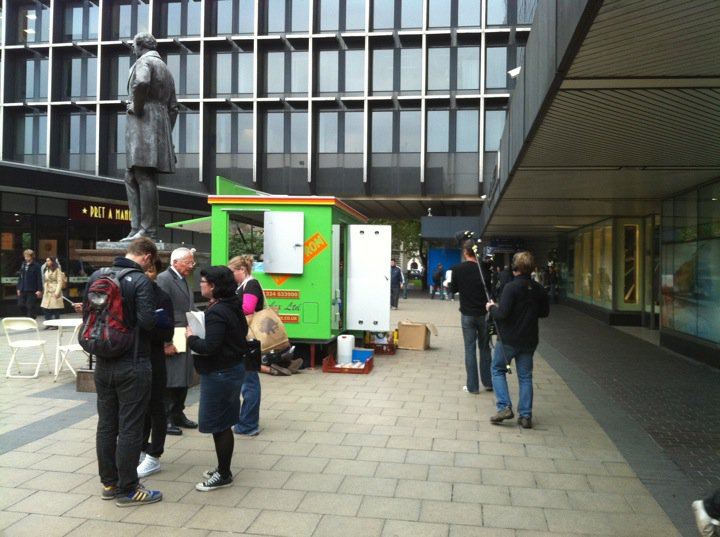 Earlier today, as I approached Euston Station in search of a bite to eat, I was approached by a woman politely offering a very small container of mixed fruit. She didn’t state a price, though I later learned it was on sale for a seemingly steep £2.50. I walked on … and in my fast-paced-negotiating-London-myopia, I almost did not notice that I’d just walked through a ‘task’ being filmed for the BBC television programme The Apprentice. It only struck me when I noticed Nick Hewer brooding nearby – one of host Alan Sugar’s deputies on the programme – vaguely visible in the photo above.
Earlier today, as I approached Euston Station in search of a bite to eat, I was approached by a woman politely offering a very small container of mixed fruit. She didn’t state a price, though I later learned it was on sale for a seemingly steep £2.50. I walked on … and in my fast-paced-negotiating-London-myopia, I almost did not notice that I’d just walked through a ‘task’ being filmed for the BBC television programme The Apprentice. It only struck me when I noticed Nick Hewer brooding nearby – one of host Alan Sugar’s deputies on the programme – vaguely visible in the photo above.
After getting my food, I sat at the nearby benches for quite some time, watching the filming action unfold. The benches had become, in part, something of a viewing gallery. What a great example for teaching, I thought; I could already imagine interesting discussions that might emerge with students about how sites of media production work outside of more enclosed settings like the studio, office, or newsroom. Actually, it would pair quite nicely with a discussion of Nick Couldry’s excellent book The Place of Media Power, which explores how we might understand media power in a more unusual register, by looking events and milieus in which ordinary people come into contact with professionalised media practices (Couldry uses the examples of visitors to the outdoor set of Coronation Street, and protesters against animal exports in Brightlingsea).
So interesting were these unfolding actions that I decided to video record some of what was happening. My thinking was that later on this year, it might be interesting to ask my students to look at the footage ethnographically – to consider what is going on in the interactions of contestants, producers, media runners, camera and microphone operators, passersby, and all the gawkers with their mobile phones, taking photos and uploading them to Facebook (me included, I should add). And, to consider the implications of all this happening around a high traffic passage outside London’s Euston Station.
I video recorded for a while between other spectators, but eventually a better spot opened up, and I made a move to what had effectively ended up as the front row. Just as I did so, in the corner of my eye I saw that one of the production people had noticed me and was rushing over. Rather authoritatively, she stated that I would have to delete the video I had just taken. BBC, she confidently advised me, owns all the content taken at that location. I found this hard to believe, and asked her on what authority they could compel me to delete the content I had recorded. My only intention, I added, was to use the footage for students in the classroom.
I refused the demands, of course – their response was to ask for my contact details, apparently to be contacted by their press officer at a later date. In any event, I actually felt quite fortunate to be accosted as I had. It adds another potentially interesting dimension to the example: on what bases do agents of media production claim proprietorship when a site of media production takes in an urban public space? On the back of legislation? Under contract law? Or in the performance of (mediatised) moral authority?
I thought I would just pop in to say “Hello!”. How did I find my way here? The link in your e-mail…
This would have fitted neatly into your lecture! I was rather bemused by the BBC team’s reaction. Their spokeswoman, that is. Was she an “apprentice” too?
Mediatised authority indeed! I don’t think she/BBC had a case but you might have had. For harassment, say. No win, no fee. Eh! I was only joking! 🙂
Al
Nice bit of urban serendipity Scott! BBC = public broadcaster = they own public space, of course. I guess they must have paid Network Rail or whoever runs Euston now a fee and would ultimately wheel out a permit…interesting test case as to who owns British railway stations. There is a parallel with the monopoly distribution rights of free newspapers there too I guess.
donald
Very interesting point about the newspaper paralllel. Talkback Thames (who produce The Apprentice for the BBC) later called me at my office phone, leaving a message advising that I am unable to show the video clip to my class, at least not before the broadcast of the programme (I’ve learned I stumbled onto next year’s version, not the one curently on the air). But again, they did so without any reference to the authority on which they are relying. Either because they have none, or feel no need to be explicit about it.
[…] It is (barely) visible in the bottom right of the above photo. It had me thinking back to my run-in with Talkback Thames when I attempted to film people filming The Apprentice at this exact same location. Who controls […]